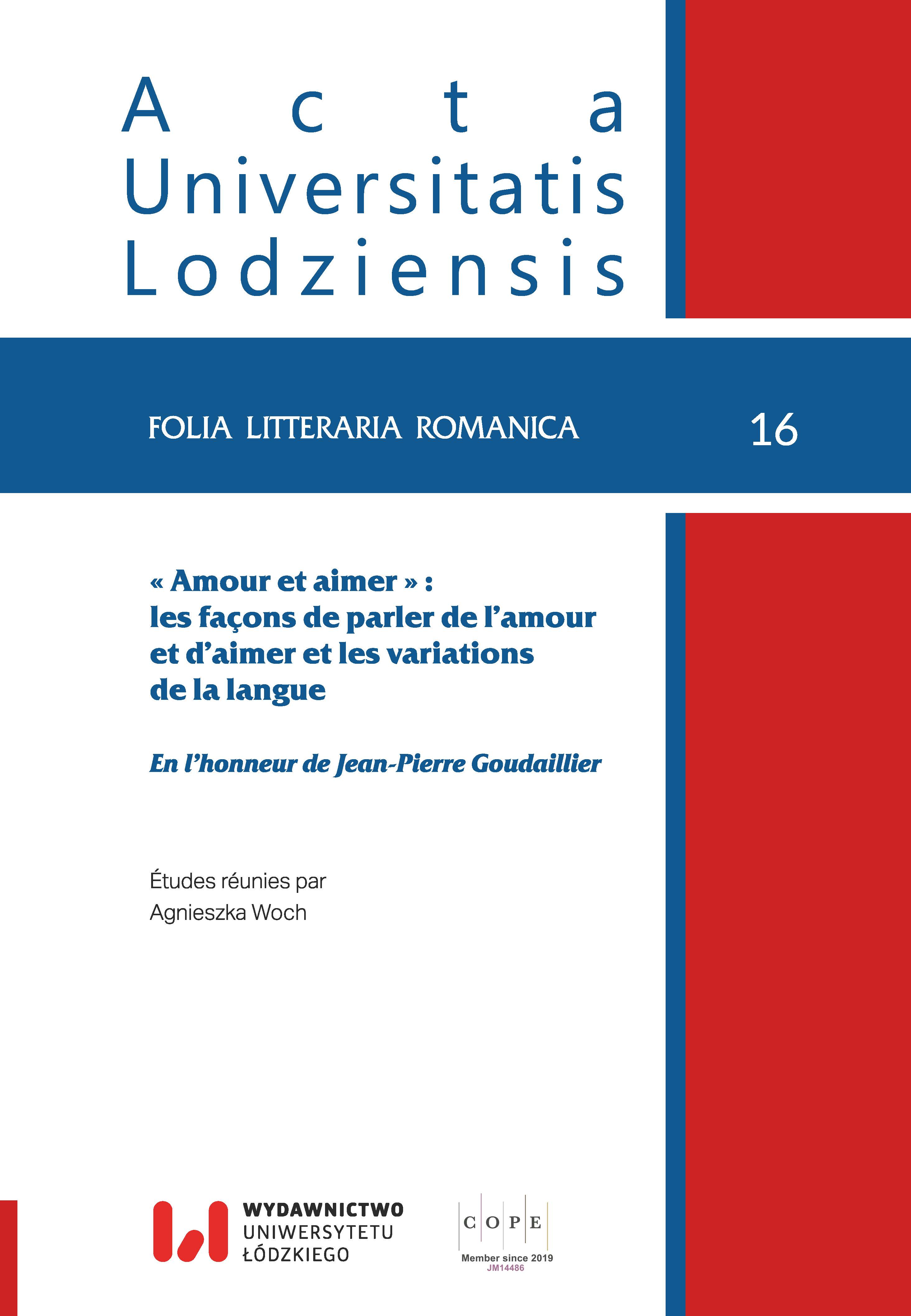Do tomber amoureux and zakochać się Describe the Same Reality?
DOI:
https://doi.org/10.18778/1505-9065.16.06Keywords:
tomber amoureux, zakochać się, invariant, collocation, prefix, meaning analysis, intensity, change of stateAbstract
The aim of the article is to analyze the French phrase tomber amoureux and the prefixed Polish verb zakochać się. The analysis aims to see if the semantic contents of the two verbs, which result of their constructions, are exactly the same. The invariant of tomber, which has both locative and non-locative / abstract uses, is complex and includes two basic meaning elements: downward movement and contact, which the language selects according to the given use. On the other hand, the phrase tomber amoureux can be analyzed as a collocation, where tomber is a collocator. The Polish predicate is built on the basis of kochać (psychological verb), with the prefix za-. Polish attaches considerable importance to the prefix, the meaning of which is added to that of the verbal base. The analysis reveals that tomber amoureux expresses a change of state and underlines the beginning of the action, while zakochać się emphasises the intensity of the feeling to which the verbal base refers.
Downloads
References
CHOLEWA, Joanna (2017), Conceptualisation et éléments de construction du sens de tomber et de (-)paść/(-)padać, Białystok, Wydawnictwo Uniwersytetu w Białymstoku
Google Scholar
CISLARU, Georgeta (2014), « Sémantique des noms et des verbes d’affect : un parcours chronologique et épistémique », Cahiers de lexicologie, n° 105, p. 117-139
Google Scholar
DESCLÉS, Jean-Pierre (1996), « Appartenance/inclusion, localisation, ingrédience et possession », Faits de langues, n° 7, p. 91-100
Google Scholar
DOI: https://doi.org/10.3406/flang.1996.1078
DESCLÉS, Jean-Pierre (2005), « La polysémie verbale, un exemple, le verbe avancer » in La polysémie (O. Soutet éd.), Paris, Presses de l’Université de Paris-Sorbonne, p. 111-136
Google Scholar
GIERMAK-ZIELIŃSKA, Teresa (1979), Polskie czasowniki przedrostkowe o znaczeniu przestrzennym i ich odpowiedniki w języku francuskim, Wrocław, Zakład Narodowy imienia Ossolińskich
Google Scholar
GRZEGORCZYKOWA, Renata, LASKOWSKI, Roman, WRÓBEL, Henryk (1998), Gramatyka współczesnego języka polskiego. Morfologia, Warszawa, PWN
Google Scholar
HAUSMANN, Franz Josef (2007), « Lexicographie française et phraséologie » in Collocations, phraséologie, lexicographie. Études 1977-2007 (E. Haag éd.), Maastricht, Shaker Verlag, p. 121-153
Google Scholar
KOPECKA, Anetta (2004), Étude typologique de l’expression de l’espace : localisation et déplacement en français et en polonais, thèse de doctorat, Sciences du Langage, Université Lumière Lyon 2, Lyon
Google Scholar
KWAPISZ-OSADNIK, Katarzyna (2009), Le verbe français dans un cadre cognitif, Katowice, Wydawnictwo Uniwersytetu Śląskiego
Google Scholar
LAMIROY, Béatrice (1987), « Les verbes de mouvement : emplois figurés et extensions métaphoriques », Langue française, n° 76, p. 41-58
Google Scholar
LANGACKER, Ronald Wayne (1987), « Mouvement abstrait », Langue française, n° 76, p. 59-76
Google Scholar
DOI: https://doi.org/10.3406/lfr.1987.4731
PRZYBYLSKA, Renata (2006), Schematy wyobrażeniowe a semantyka polskich prefiksów czasownikowych do-, od-, prze-, roz-, u-, Kraków, Universitas
Google Scholar
STOSIC, Dejan (2001), « Le rôle des préfixes dans l’expression du déplacement. Éléments d’analyse à partir des données du serbo-croate et du français », Cahiers de Grammaire, n° 26, p. 207-228
Google Scholar
TUTIN, Agnès (2013), « Les collocations lexicales : une relation essentiellement binaire définie par la relation prédicat-argument », Langages, n° 189, p. 47-63
Google Scholar
DOI: https://doi.org/10.3917/lang.189.0047
WŁODARCZYK, André, WŁODARCZYK, Hélène (2001), « La préfixation verbale en polonais », Studia Kognitywne, n° 4, p. 93-109
Google Scholar
WRÓBEL, Henryk (1976), « Prefiksacja czasowników a aktualizacja struktur predykatowo-argumentowych », Otazky slovanske syntaxe, n° IV/1, p. 175-180
Google Scholar
Doroszewski, Witold (1958), Słownik Języka polskiego, Polska Akademia Nauk, Warszawa
Google Scholar
Słownik Języka polskiego PWN https://sjp.pwn.pl consulté le 11 octobre 2019
Google Scholar
Wielki Słownik Języka Polskiego https://sjp.pwn.pl consulté le 11 octobre 2019
Google Scholar
Downloads
Published
How to Cite
Issue
Section
License

This work is licensed under a Creative Commons Attribution-NonCommercial-NoDerivatives 4.0 International License.













